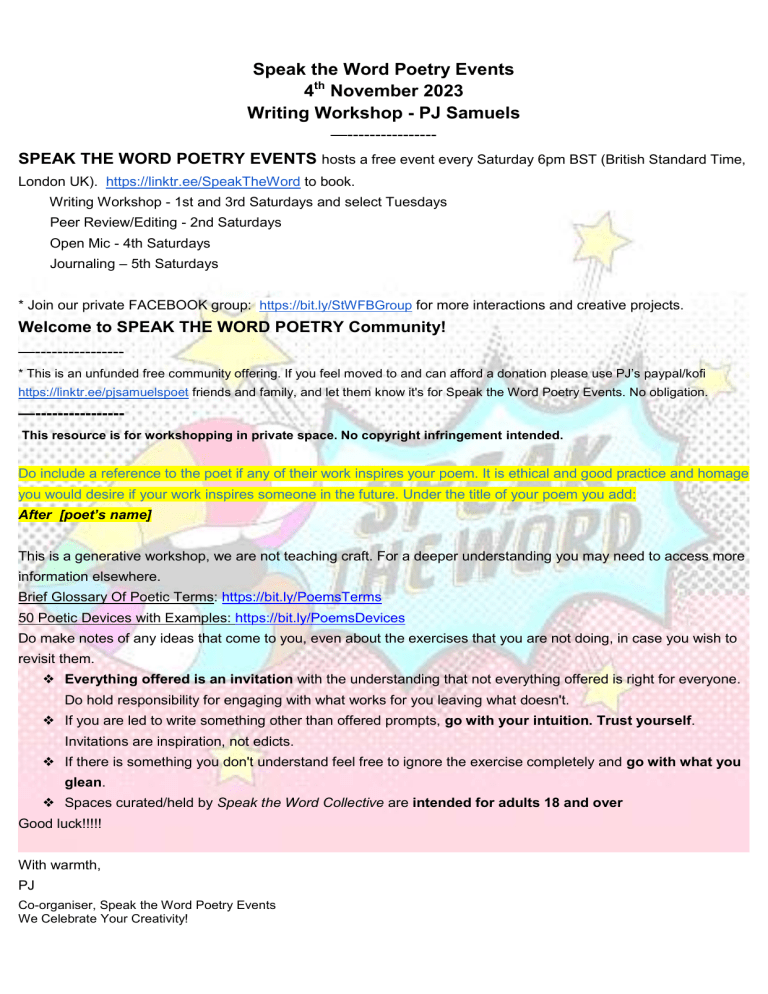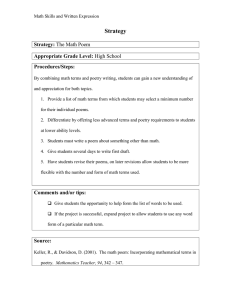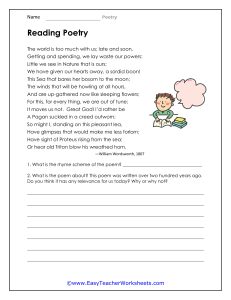Speak the Word Poetry Events Writing Workshop Journey and Witness PJ Samuels 4Nov2023
advertisement

Speak the Word Poetry Events 4th November 2023 Writing Workshop - PJ Samuels —---------------SPEAK THE WORD POETRY EVENTS hosts a free event every Saturday 6pm BST (British Standard Time, London UK). https://linktr.ee/SpeakTheWord to book. Writing Workshop - 1st and 3rd Saturdays and select Tuesdays Peer Review/Editing - 2nd Saturdays Open Mic - 4th Saturdays Journaling – 5th Saturdays * Join our private FACEBOOK group: https://bit.ly/StWFBGroup for more interactions and creative projects. Welcome to SPEAK THE WORD POETRY Community! —---------------* This is an unfunded free community offering. If you feel moved to and can afford a donation please use PJ’s paypal/kofi https://linktr.ee/pjsamuelspoet friends and family, and let them know it's for Speak the Word Poetry Events. No obligation. —---------------This resource is for workshopping in private space. No copyright infringement intended. Do include a reference to the poet if any of their work inspires your poem. It is ethical and good practice and homage you would desire if your work inspires someone in the future. Under the title of your poem you add: After [poet’s name] This is a generative workshop, we are not teaching craft. For a deeper understanding you may need to access more information elsewhere. Brief Glossary Of Poetic Terms: https://bit.ly/PoemsTerms 50 Poetic Devices with Examples: https://bit.ly/PoemsDevices Do make notes of any ideas that come to you, even about the exercises that you are not doing, in case you wish to revisit them. ❖ Everything offered is an invitation with the understanding that not everything offered is right for everyone. Do hold responsibility for engaging with what works for you leaving what doesn't. ❖ If you are led to write something other than offered prompts, go with your intuition. Trust yourself. Invitations are inspiration, not edicts. ❖ If there is something you don't understand feel free to ignore the exercise completely and go with what you glean. ❖ Spaces curated/held by Speak the Word Collective are intended for adults 18 and over Good luck!!!!! With warmth, PJ Co-organiser, Speak the Word Poetry Events We Celebrate Your Creativity! We invite you to set your intention for this workshop as we go into this meditation. We invite you to participate as much or as little as feel comfortable for you. Londrelle Live And Unplugged - London ----------------Warmup Exercise: Write about a nature scene that catches your attention. Be excruciatingly minutely detailed and engage all your senses. How much wonder does a single flower or a single leaf hold for you? Do not write emotions ----------------- Content note: war; displacement; refugee narratives; loss, death; alienation; sounds of bombs and guns ----------------- Julie Beveridge Cold Hands Touch My Face I consider leaving this place, pushing my thumb into the oncoming traffic and rolling through. There is always less to leave behind than waits ahead, you just have to know what cars to get into and which to wave on. I walk backwards down the motorway the wind egging me on. The first thing I see is an indicator—a family sedan, dusty mud flaps, empty baby seat slows and pulls over. His gentle bearded face smiles me into the passenger seat and I tell him that I'm going to the city, my car broke down and I have contacts there. He is safe, he fiddles with the radio whistling along to every new tune. The heat of the day lets me drift into sleep. I feel him driving next to me. I will wake up fresh, a whole new road ahead. cold hands touch my face they are not mine From <https://contemporaryhaibunonline.com/chohtmlarchive/pages021/Beveridge_ColdHands.html> ----------------- Adelaide B. Shaw Seasons of War Church in the early morning; a stop at the bakery for fresh rolls; hopscotch in front of the house. The beginning of an ordinary Sunday in our New England town. December cold rippling through the neighborhood news of Pearl Harbor Within weeks our lives change. No butter, no meat, no short wave radio. Seasons blend one into the other. In the spring, my uncle leaves for the army, his whereabouts a continuous worry. Each day the wait for his letter, and when it comes, unable to read any meaning between censored words. the neighbor's lilacs— a teasing hint of fragrance on the breeze At night, surprise black-outs. Listening in the dark to the block warden's footsteps approach and fade away. the windows open— supper by moonlight until the all clear My mother works now. The swing shift at the mill, weaving olive drab and khaki. rain in the air— raking leaves with Grandpa after school As the months and years pass we develop new games. No more playing cowboys and Indians. We become army nurses, bomber pilots, soldiers with machine guns. snowballs fly— everyone wants to be on the winning side At home, the talk is often heavy with long pauses. Frequent mention of "my brother in Naples, the cousins in Sicily." Our prayers are longer. A sameness settles in; even war has a familiar routine. Another bond drive; a new scrap drive. Nothing wasted and everything saved; make-do and make over. "It's the war" becomes the explanation for everything. Victory Garden— more buggy tomatoes on the ground From <https://contemporaryhaibunonline.com/chohtmlarchive/pages021/Shaw_SeasonsOfWar.html> ----------------- Graham High DEATH VALLEY glimpsed through the windscreen not quite a shooting star— but a satellite It's late into the night and I'm too tired to drive any more. I pull off tarmac into sand. The car's small juddering death brings to life an overwhelming silence. Death Valley: It is the nearest place to nowhere that anyone could tell me of. The interior light of my car renders me blind to all outside, and vulnerable; its little bulb-ego blares in the silence. I arrange my sleeping bag hurriedly; lock myself in the car, frightened that the Universe will see me. I curl up and quench my yellow presence. The moon-light swells silently as my eyes adjust. Beneath the clear sky there is only dust—grey mountains behind one grey plain. Spectres of rocks slowly appear like planets from the desert and nothing stirs. I myself am still, a face, a huddled shoulder at the window. After an hour a stone moves, becomes a comet of shadow. A single small creature is silently exploring the expanses of its solitude. Before dawn I too must leave the safety of the car. There may be scorpions? or snakes? choosing the most naked place under the stars to take a shit In the morning I check my life support systems—gas tank half full; water—two litres; a little food. I watch a lizard for maybe an hour, almost oblivious of time, and then drive on, heading for the way out. From <https://contemporaryhaibunonline.com/chohtmlarchive/pages021/High_DeathValley.html> ----------------- What They Took With Them 12 Sept 2016 #WithRefugees Cate Blanchett performs the rhythmic poem ‘What They Took With Them’ alongside fellow actors Keira Knightley, Juliet Stevenson, Peter Capaldi, Stanley Tucci, Chiwetel Ejiofor, Kit Harington, Douglas Booth, Jesse Eisenberg and Neil Gaiman. The poem was written by Jenifer Toksvig and was inspired by stories and first-hand testimonies from refugees forced to flee their homes and items they took with them. One of the sources for the poem was Brian Sokol’s photography project, ‘The Most Important Thing,’ made in collaboration with UNHCR. Many of Brian's photos, along with firsthand accounts from the refugees he photographed, are featured in the film. Released exclusively on Facebook, the film urges people to sign the #WithRefugees petition to help ensure refugees have the basics to build back their lives – an education, somewhere safe to live and the opportunity to work. ----------------- The Haibun is a literary form combining prose and short form poetry. The invitation: Write a haibun centred in travel possibly because of displacement (by war/famine/persecution/family disagreements... for eg). You could choose to think on what you take, what you leave, what you see as you travel, your internal conversation, are you travelling alone. Do not write emotions. Things that surprise you whether by their familiarity or their strangeness. You could choose a historical event and write it from first person experience as in ‘Shaw – Seasons of War’. How would things (items; environment; building/s; people; pets) change for you with the realisation this could be the last time you see them? The rose garden you tended carefully all year? The cherry tree coming into bloom? What pops up more poignant and what fades into the background? What is this background and what does it sound like? (engage all the senses in the descriptions and heavy on the metaphors)There is no prescribed length. ----------------- Mahmoud Darwish Book: Unfortunately, It Was Paradise Selected Poems Translated and Edited by Munir Akash and Carolyn Forche (with Sinan Antoon and Amira El-Zein) University of California Press Berkeley· Los Angeles· London © 2003 by the Regents of the University of California Library of Congress Cataloging-in-Publication Data Darwish, Mahmoud. Introduction Mahmoud Darwish is a literary rarity. Critically acclaimed as one of the most important poets in the Arabic language and beloved as the voice of his people, he is an artist demanding of his work continual transformation and a living legend whose lyrics are sung by field workers and schoolchildren. Few poets have borne such disparately bestowed adulation, nor survived such dramatic vicissitudes of history and fate as Mahmoud Darwish; even fewer have done so while endeavoring to open new possibilities for poetry while assimilating one of the world's oldest literary traditions. His poetry has been enthusiastically embraced since the publication of his first volume, Leaves of Olive, in 1964. After the Arab defeat in the 1967 war, Darwish raised his voice in searing lyrics confronting the pain of everyday life for Palestinians. In a realism stripped of poetic flourish, the "poetry of resistance" was born. With Nerudian transparency, his poems of the sixties and early seventies reflected his pain over the occupation of his homeland and his lingering hopes for its liberation. ----------------- Mahmoud Darwish The Night There The night there is pitch black . . . and roses are fewer. The road will fork even more than before . The valley will split open and the slope will collapse on us. The wound opens wide. Relatives flee. Victims kill each other to erase their victims' sight and find relief. We'll know more than we knew before. One abyss will lead to another. When we embrace an idea worshipped by tribes and branded on their vanishing bodies, we'll witness emperors engraving their names on grains of wheat to show their power. Aren't we changed? Men follow the teachings of the sword and spill blood. Let the sand pile up. Women who believe in what's between their thighs follow the teachings of lewdness. Let the shadow shrink. Yet, I will follow the path of the song, even though my roses are fewer. ----------------The Invitation: Using the night as a space holder (metaphor) for a moment/experience/place write a poem telling the reader about the night. It does not need to be a dark experience and you can use whatever holder works for you. (that morning. The evening there. Dusk in that place). Take the reader to the place and tell about what happens/ is happening. ----------------- Mahmoud Darwish Athens Airport Athens airport disperses us to other airports. Where can I fight? asks the fighter. Where can I deliver your child? a pregnant woman shouts back. Where can I invest my money? asks the officer. This is none of my business, the intellectual says. Where did you come from? asks the customs' official. And we answer: From the sea! Where are you going? To the sea, we answer. What is your address? A woman of our group says: My village is the bundle on my back. We have waited in the Athens airport for years. A young man marries a girl but they have no place for their wedding night. He asks: Where can I make love to her? We laugh and say: This is not the right time for that question. The analyst says: In order to live, they die by mistake. The literary man says: Our camp will certainly fall. What do they want from us? Athens airport welcomes its visitors without end. Yet, like the benches in the terminal, we remain, impatiently waiting for the sea. How many more years longer, 0 Athens airport? ----------------- The invitation: ----------------- Think of being at a point of crossing in your life (could be a rite of passage – marriage, childbirth, grandchild, loss of someone you love or indeed a physical place – moving house, migrating, moving out on your own, displacement) and the questions asked of you and who would be asking them and what your answer would be. Be creatively poetic with your answers (and indeed the questions) and lean into the surreal. The Museum of Stones Carolyn Forché 1950 – Carolyn Forche Reads Her Poem, "The Museum Of Stones" These are your stones, assembled in matchbox and tin, collected from roadside, culvert, and viaduct, battlefield, threshing floor, basilica, abattoir– stones, loosened by tanks in the streets from a city whose earliest map was drawn in ink on linen, schoolyard stones in the hand of a corpse, pebble from Apollinaire’s oui, stone of the mind within us carried from one silence to another, stone of cromlech and cairn, schist and shale, horneblende, agate, marble, millstones, ruins of choirs and shipyards, chalk, marl, mudstone from temples and tombs, stone from the tunnel lined with bones, lava of a city’s entombment, stones chipped from lighthouse, cell wall, scriptorium, paving stones from the hands of those who rose against the army, stones where the bells had fallen, where the bridges were blown, those that had flown through windows, weighted petitions, feldspar, rose quartz, blueschist, gneiss and chert, fragments of an abbey at dusk, sandstone toe of a Buddha mortared at Bamiyan, stone from the hill of three crosses and a crypt, from a chimney where storks cried like human children, stones newly fallen from stars, a stillness of stones, a heart, altar and boundary of stone, marker and vessel, first cast, lode and hail, bridge stones and others to pave and shut up with, stone apple, stone basil, beech, berry, stone brake, stone bramble, stone fern, lichen, liverwort, pippin and root, concretion of the body, as blind as cold as deaf, all earth a quarry, all life a labor, stone-faced, stone-drunk with hope that this assemblage of rubble, taken together, would become a shrine or holy place, an ossuary, immoveable and sacred like the stone that marked the path of the sun as it entered the human dawn. Copyright © 2007 by Carolyn Forché. Originally published in The New Yorker. Reprinted from Split This Rock’s The Quarry: A Social Justice Poetry Database. From <https://poets.org/poem/museum-stones> ----------------- The invitation: Write a poem discussing your collection of figurative stones (or literal if you have them. Or shells. Whatever you collect). Are they neatly labelled and catalogued or just a jumble in a container? Do you remember what they are for or do you just get a wispy tendril of a memory when you hold them? Do they have a different resonance at different times you interact with them? Have the way you feel changed over time about the memory they hold/represent? Bring in a stone to represent impactful things in your life (events, places, people, thoughts, things). The big things, the little things. Bring your stones in label them, all sizes shapes and types, paint them pretty (or not) and build your beautiful cathedral of stones ----------------- Happy writing!!!!!


